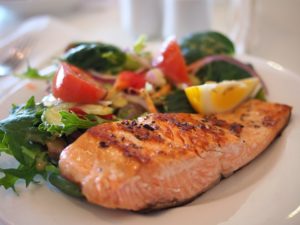Salmon is a species of fish which is found both in fresh water (rivers) and saline water (seas), depending on the stage of its development. The scientific name of the salmon family is Oncorhynchus (the prefix used for the Salmon family), which is followed by other suffixes depending upon the variety, such as Cherry Salmon or Pink Salmon.
Uses
-
Used for cooking and as a nutritional supplement.
Benefits
- Good Source of Vitamins, Proteins and Essential MineralsProteins, or accumulations of amino acids, are essential components of our cells, tissues, enzymes, hormones and every other body part. The proteins from salmon, and most other fishes, are easily digestible and easily absorbed into the body. They don’t have any adverse side effects, nor do they contain carcinogenic compounds like some other meats do.
Salmon is also a source of “good” cholesterol (omega-3 fatty acids) which also plays a vital role in keeping you healthy. Salmon is also rich in some essential minerals like iron, calcium, selenium and phosphorus, as well as vitamins like A, B and D. Selenium, which is necessary for metabolism of tissues, hair, and nails, is best obtained from animal proteins. Among animals, salmon is one of the best sources for this trace element.
- Metabolism: The omega-3 fatty acids, vitamin D and selenium within salmon all combine to help manage insulin levels throughout the body, thereby facilitating the absorption of sugar and the subsequent lowering of blood sugar levels.
- Cardiovascular Health: While the omega-3 fatty acids help reduce cholesterol, maintain flexibility of arteries and veins and strengthen cardiac muscles, the essential amino acids repair damages to the cardiovascular tissues. They help reduce the blood pressure as well, by lowering cholesterol levels and preventing the hardening of artery walls. This considerably reduces the chances of heart attacks.
- Brain & Nerves: The omega-3 fatty acids increase the efficiency of brain functions, improves memory and keep it active during long working hours. Along with the amino acids, vitamin A, vitamin D, and selenium, these fatty acids protect the nervous system from damage related to aging, acts as an antidepressant, relaxes the brain and also helps in treating Alzheimer’s and Parkinson’s disease. Perhaps that is why fish eaters are supposedly more intelligent than the meat eaters.
- Eye Care: Again, the omega-3 fatty acids and amino acids help to prevent macular degeneration, retinal dryness, loss of vision and fatigue of the eyes. It is a proven fact that people who eat fish regularly, or at least more than others, have better vision than those who don’t.
- Other BenefitsOmega-3 fatty acids reduce inflammation of the arteries and the digestive system, reduce chances of colon, prostate, and kidney cancers. Furthermore, salmon can improve skin texture, add some sparkle to your eyes, skin, hair and nails and help in the growth of beneficial bacteria in the colon.
The fatter the salmon, the more nutritious and healthy it is. It is a good protein supplement for older or sick people as well, since it is easy to digest. In some parts of the world, it is cheaper than other sources of animal proteins like red meat and poultry.
Cautions
There is also one more rarely occurring, but potentially increasing, side effect when consuming fish products. Even though they improve circulation and can reduce the risk of blood clots, in some cases the omega-3 fatty acids dilute the blood more than is necessary. But this is only seen in the excessive consumption of fish by people who already have bleeding disorders
Interactions
n/a
Other names
Oncorhynchus
References
Source: Organic Facts, https://www.organicfacts.net/salmon.html
TastyCraze, http://tastycraze.com/n5-50142-Side_Effects_of_Eating_Salmon_and_Tuna

